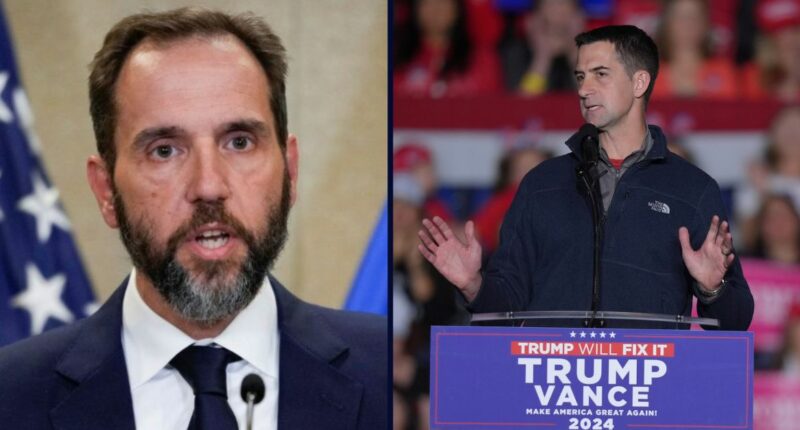Share this @internewscast.com
Left: Special counsel Jack Smith addresses the media about an indictment of former President Donald Trump on August 1, 2023, at a Department of Justice office in Washington (AP Photo/J. Scott Applewhite, File). Right: Sen. Tom Cotton, R-Ark., speaks ahead of a campaign rally featuring Republican presidential candidate former President Donald Trump on Monday, November 4, 2024, in Reading, Pa. (AP Photo/Chris Szagola).
Weeks after Sen. Tom Cotton, R-Ark., submitted an ethics complaint against former special counsel Jack Smith, criticizing the investigation and prosecution of President Donald Trump during his 2024 campaign, Smith’s attorneys have countered that the claims of Hatch Act violations are “unprecedented” and unlikely to succeed.
Cotton had demanded an inquiry into whether Smith “illegally took political actions to influence the 2024 election to damage then-candidate President Donald Trump,” arguing that many of the then-special counsel’s “legal maneuvers appear to lack justification” aside from politics.
In a letter to the Office of Special Counsel (OSC) and its acting head Jamieson Greer, attorneys from Covington & Burling, Lanny Breuer and Peter Koski, argued that claims of Smith’s unlawful “political activity” are “completely baseless,” providing at least five key reasons why Cotton’s basis for an investigation is “imaginary and unfounded.”
During the investigation of President Nixon, when litigating access to White House tapes, the Special Prosecutor sought certiorari before judgment, which bypassed the court of appeals to take the case directly to the Supreme Court from the district court. The Supreme Court granted the petition for certiorari before judgment due to “the public importance of the issues presented and the need for their prompt resolution.” Mr. Smith simply adhered to this precedent in following the appellate litigation approach set by the Supreme Court 50 years ago.
As reported by Law&Crime, the OSC explains that violations of the Hatch Act could lead to “removal from federal service, demotion, prohibition from federal service for up to 5 years, suspension, reprimand letter, or a civil fine not exceeding $1,000.”
Of note, Smith is not currently in federal service, meaning that a reprimand and fine might be the most serious repercussions he’d face — if the investigation goes anywhere.











